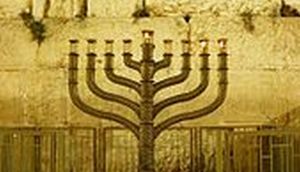“So do we put presents under the turkey, or what?”
 Newport News, Virginia (AP) – The relatively early occurrence of Hanukkah this year has sown perplexity among assimilated American Jews, who have become accustomed to combining or confusing the holiday’s practices with those of Christmas and not Thanksgiving. The first day of Hanukkah comes out this Thursday, which is also Thanksgiving.
Newport News, Virginia (AP) – The relatively early occurrence of Hanukkah this year has sown perplexity among assimilated American Jews, who have become accustomed to combining or confusing the holiday’s practices with those of Christmas and not Thanksgiving. The first day of Hanukkah comes out this Thursday, which is also Thanksgiving.
The lunar Jewish calendar has a typical year lasting approximately 354 days, making it 11 days shorter than the solar year. A complicated cycle of leap years every two or three years adds 30 days to keep it more or less in sync with the solar calendar. The current Jewish year, traditionally numbered at 5774, is such a leap year, but the extra month is added late in the wintertime, meaning that until then, Jewish days of note occur much earlier than usual relative to their solar calendar counterparts. As such, those who are used to a Hanukkah bush or Menorah-nativity scene now face the dilemma of finding a different way of bastardizing the symbols and practices of a holiday born of a struggle against cultural assimilation.
“So do we put presents under the turkey, or what?” wondered 35-year-old attorney Trevor Steinberg. “Does the pumpkin pie get served in a special stocking hanging from the fireplace?” He confessed that he didn’t grow up with any particular religious tradition, but that his parents took him to synagogue a few days a year and made sure to use only certified kosher matzoh when serving pork hors d’oeuvres at Passover dinner parties.
It’s a common challenge, notes Rabbi Timothy Lieberman III of Congregation B’not Kuttim. “As the latest statistics show, American Jews are intermarrying at unprecedented rates, and that presents obstacles of all sorts, not least of which is how to further dilute the Jewish content of time-tested rituals when a century-and-a-half of trying to erase the differences between Jews and the host culture has all but eliminated any meaningful distinction,” he explained. Since most of the effort involving Hanukkah has revolved around shoehorning its traditions into the trappings of Christmas, assimilated Jews find themselves in unfamiliar territory when it comes to making the non-Jewish holiday primary and leaving only a token acknowledgment of their own ancient heritage intact.
The challenge of obscuring the Jewish themes is compounded because one of the chief elements of Hanukkah emphasized in ancient Jewish sources is that of giving thanks. In fact, says Rabbi Gloria Christiansen, the very word “Jew” ultimately derives from the Hebrew word for gratitude. “That means those of us who have made it our mission to push any sense of responsibility that Jewish ideas might spark as far away as possible have a unique problem this year, when even the non-Jewish holiday we’re celebrating stresses the same theme,” she said.
Moreover, she pointed out, the Hebrew term for turkey, tarn’gol hodu (“India fowl”), also evokes the theme of gratitude, as “hodu” means “give thanks.”
“I suppose one of the main messages I can give my community this year is that it’s just fine, once every nineteen years or so, give proper voice to our traditions,” she added.
Please support our work through Patreon.





Today, the 23rd of Marcheshvan, is Thanksgiving. Your article does NOT match the facts of the calendar.
You might also note that the article refers to the current year as 5774, which is when the article was written.